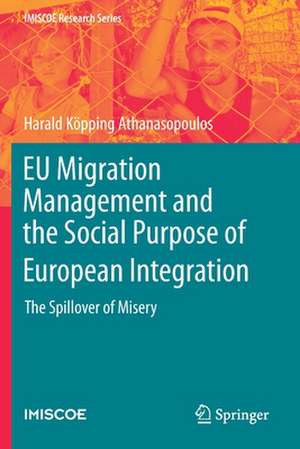EU Migration Management and the Social Purpose of European Integration: The Spillover of Misery: IMISCOE Research Series
Autor Harald Köpping Athanasopoulosen Limba Engleză Paperback – 30 apr 2021
| Toate formatele și edițiile | Preț | Express |
|---|---|---|
| Paperback (1) | 448.21 lei 6-8 săpt. | |
| Springer International Publishing – 30 apr 2021 | 448.21 lei 6-8 săpt. | |
| Hardback (1) | 528.13 lei 6-8 săpt. | |
| Springer International Publishing – 30 apr 2020 | 528.13 lei 6-8 săpt. |
Din seria IMISCOE Research Series
-
 Preț: 228.70 lei
Preț: 228.70 lei -
 Preț: 279.98 lei
Preț: 279.98 lei -
 Preț: 422.90 lei
Preț: 422.90 lei -
 Preț: 279.62 lei
Preț: 279.62 lei -
 Preț: 451.76 lei
Preț: 451.76 lei -
 Preț: 179.42 lei
Preț: 179.42 lei -
 Preț: 424.81 lei
Preț: 424.81 lei -
 Preț: 438.26 lei
Preț: 438.26 lei -
 Preț: 280.27 lei
Preț: 280.27 lei -
 Preț: 132.95 lei
Preț: 132.95 lei -
 Preț: 281.15 lei
Preț: 281.15 lei -
 Preț: 266.19 lei
Preț: 266.19 lei -
 Preț: 359.43 lei
Preț: 359.43 lei -
 Preț: 231.66 lei
Preț: 231.66 lei -
 Preț: 436.35 lei
Preț: 436.35 lei -
 Preț: 434.44 lei
Preț: 434.44 lei - 15%
 Preț: 700.75 lei
Preț: 700.75 lei -
 Preț: 424.43 lei
Preț: 424.43 lei -
 Preț: 425.20 lei
Preț: 425.20 lei -
 Preț: 429.83 lei
Preț: 429.83 lei -
 Preț: 425.58 lei
Preț: 425.58 lei -
 Preț: 429.61 lei
Preț: 429.61 lei -
 Preț: 424.43 lei
Preț: 424.43 lei -
 Preț: 426.18 lei
Preț: 426.18 lei -
 Preț: 420.79 lei
Preț: 420.79 lei -
 Preț: 426.94 lei
Preț: 426.94 lei -
 Preț: 429.61 lei
Preț: 429.61 lei -
 Preț: 425.42 lei
Preț: 425.42 lei - 15%
 Preț: 636.45 lei
Preț: 636.45 lei -
 Preț: 426.18 lei
Preț: 426.18 lei -
 Preț: 424.99 lei
Preț: 424.99 lei -
 Preț: 430.21 lei
Preț: 430.21 lei -
 Preț: 423.84 lei
Preț: 423.84 lei -
 Preț: 427.71 lei
Preț: 427.71 lei -
 Preț: 427.71 lei
Preț: 427.71 lei -
 Preț: 433.85 lei
Preț: 433.85 lei -
 Preț: 430.79 lei
Preț: 430.79 lei -
 Preț: 424.43 lei
Preț: 424.43 lei -
 Preț: 426.56 lei
Preț: 426.56 lei - 15%
 Preț: 583.45 lei
Preț: 583.45 lei -
 Preț: 427.71 lei
Preț: 427.71 lei - 15%
 Preț: 528.13 lei
Preț: 528.13 lei
Preț: 448.21 lei
Nou
Puncte Express: 672
Preț estimativ în valută:
85.76€ • 90.02$ • 71.19£
85.76€ • 90.02$ • 71.19£
Carte tipărită la comandă
Livrare economică 11-25 aprilie
Preluare comenzi: 021 569.72.76
Specificații
ISBN-13: 9783030420420
ISBN-10: 3030420426
Pagini: 171
Ilustrații: XII, 171 p. 5 illus.
Dimensiuni: 155 x 235 x 18 mm
Greutate: 0.27 kg
Ediția:1st ed. 2020
Editura: Springer International Publishing
Colecția Springer
Seria IMISCOE Research Series
Locul publicării:Cham, Switzerland
ISBN-10: 3030420426
Pagini: 171
Ilustrații: XII, 171 p. 5 illus.
Dimensiuni: 155 x 235 x 18 mm
Greutate: 0.27 kg
Ediția:1st ed. 2020
Editura: Springer International Publishing
Colecția Springer
Seria IMISCOE Research Series
Locul publicării:Cham, Switzerland
Cuprins
Introduction.- Chapter 1: Neofunctionalism in Theory and Practice.- Chapter 2: Thinking Europe Differently – Critical Approaches to European Integration.- Chapter 3: The Margins of History – Rediscovering the Subaltern.- Chapter 4: Migration Management in the EU.- Chapter 5: Migration Management within a National Context.- Chapter 6: Being Spillover - Undocumented Migrants' Experience or European Integration.- Chapter 7: Three Contradictions of Neofunctionalist European Integration.- Conclusion: What Future for Europe?.
Notă biografică
Harald Köpping Athanasopoulos completed his PhD at the University of Liverpool Management School after having graduated as an MA in European Studies from Maastricht University and as a BA of International Relations from Swansea University. His research interests include European migration policy, neo-Gramscian theory, international political economy and European space policy. While he is active in academia as an associate professor at ESSCA School of Management Angers, he is also the head of the migration/integration department at Arbeit und Leben Sachsen in Leipzig.
Textul de pe ultima copertă
This book provides a critical analysis of irregular migration to Europe from a neo-Gramscian perspective. It demonstrates how the contemporary EU migration management regime came about within the context of a neoliberal hegemonic project, which in turn was advanced using neofunctionalist methods of integration. Relying on field research that was carried out in Bulgaria, Italy, Germany and Greece, the book also describes how European migration management is experienced by irregular migrants themselves. It suggests that the social purpose of migration management cannot be understood without assessing the experiences of the objects of migration regimes. The 2015 migration crisis revealed that large-scale migration has the potential to undermine some of the greatest achievements of the European integration project such as the Schengen system and open internal borders. This book shows that this fragility is the result of inherent contradictions within the neoliberal hegemonic project for the European Union. As such this book is an interesting read for academics, students, policy makers and all those working in international migration and European integration.
Caracteristici
Highlights the role of neofunctionalism in the European integration process Uses an innovative Gramscian approach to studying European migration policy Emphasises the underexplored concept of subalternity Contextualises the experiences of irregular migrants
